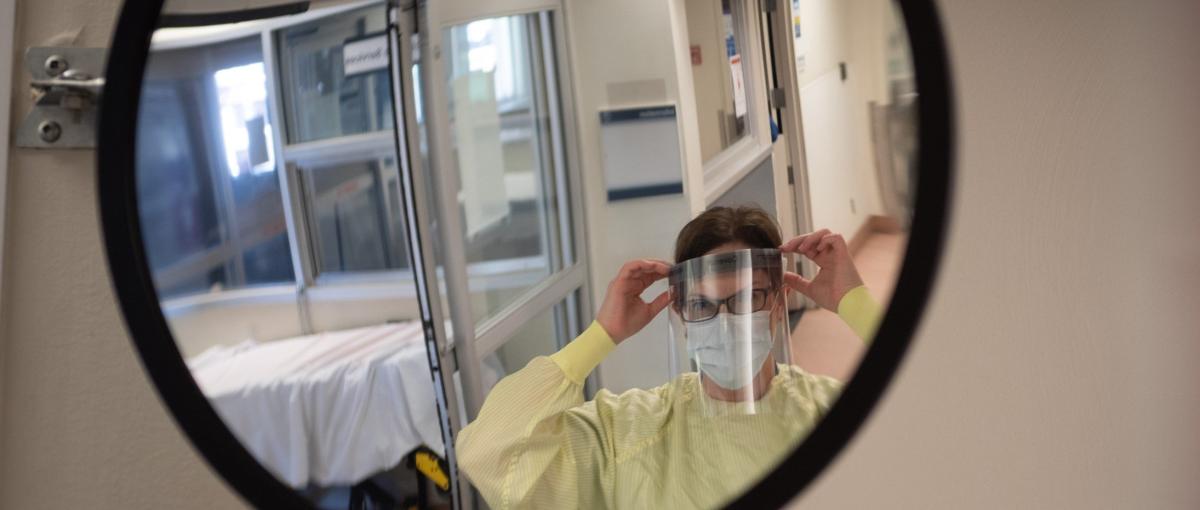Building moral resilience
We need to take care of our whole selves so we are ready to face challenges

November 26, 2020
By Karen Cho, Senior Communications Advisor, Covenant Health
Editor's note: This story was published when restrictions were in place to address early waves of the COVID-19 pandemic. It is still relevant today as healthcare workers navigate many changes the pandemic has brought to the healthcare system.
During a bedside exam of a 22-year-old quadriplegic man, Eleanor Stewart, a speech pathologist, suspected he was ingesting fluids into his lungs and suggested he be given a swallow test. The physician did not agree, leaving Eleanor feeling the patient was missing necessary care.
“I felt I had not advocated successfully for the patient and didn’t have power to change the outcome. I felt I failed this young man,” she says.
She left her job soon after. That was over two decades ago, when Eleanor was just starting her career. Now a clinical ethicist with Covenant Health, she recalls that, at the time, she was experiencing moral distress — a response that arises from a situation in which a person feels the ethically correct action to take is different from what he or she is tasked with doing.
Years later, she continued to struggle with the outcome of the incident because she was not equipped to handle a setback that she felt affected a patient’s care.
Moral distress is increasing as a result of COVID-19. Eleanor says she has been seeing more consults revolving around physicians grappling with wanting to do what is right for their patients but not necessarily being able to do so because of the pandemic.
Dr. Jennine Wismark, Covenant Health’s assistant chief medical officer of physician wellness and development, agrees with Eleanor. “Moral distress is intensifying now,” she says.
Visitation, she elaborates, continues to be a challenge for families. “People don’t understand why the family can’t come to the hospital to visit their grandmother but are allowed to eat at a restaurant.”
Jennine says physicians and other healthcare workers are still wrestling with the moral dilemma of keeping vulnerable patients safe in our facilities but having to explain to families that they can’t all visit even as the rest of the province remains relatively open. “It feels wrong, but you have to reconcile that with yourself.”
As more clinicians share their experiences, there have also been many discussions about how to restore themselves, says Eleanor. And that’s why moral resilience, the ability to sustain oneself during a long traumatic event such as a pandemic, is so important.
Eleanor believes moral resilience is integral to mitigating the effects of moral distress. However, there isn’t a one-size-fits-all solution.
“There are lots of interventions proposed, but we don’t really know which ones work the best, so we need a range of strategies.”
Laurel Kirchner, wellness advisor at Covenant Health, says there are many ways people can build resilience. When it comes to moral resilience, she has a number of recommendations, including practicing mindfulness, a technique similar to meditation that requires one to focus and be present in the moment. Cognitive flexibility, which is a person’s ability to notice and positively reframe negative thoughts, is another preferred technique for building resilience as is exercising emotional agility, which is learning to positively process difficult emotions. Laurel also says we need to make sure that self-care is a priority.
Of these recommendations, mindfulness is a practice that both Eleanor and Jennine support.
For Eleanor, the best time to practice moral resilience is before stress hits us. She complements mindfulness practice with journaling to record her emotions.
Jennine is another advocate of this concept. “I’m constantly working at self-reflection.”
She says it’s an “understated skill” among physicians because it’s sometimes perceived as a lesser or softer skill in relation to clinical expertise but is essential to one’s mental well-being. She adds that peer support, including talking about concerns, has also helped her cope.
Cultivating moral resilience, however, is not all on the individual. Eleanor says organizations and their leaders also have an important role to play.
“Organizations can revisit policy, especially if it’s causing a lot of distress. Clinical leaders can model the way, and managers should recognize and respond if certain themes are emerging.”
Laurel says we, as individuals, should always be thinking ahead. “The pandemic has been challenging. The question we should be asking ourselves is, How can we grow forward to develop skills to help us cope? Because having those practical coping skills will take us from moral distress to moral resilience.”